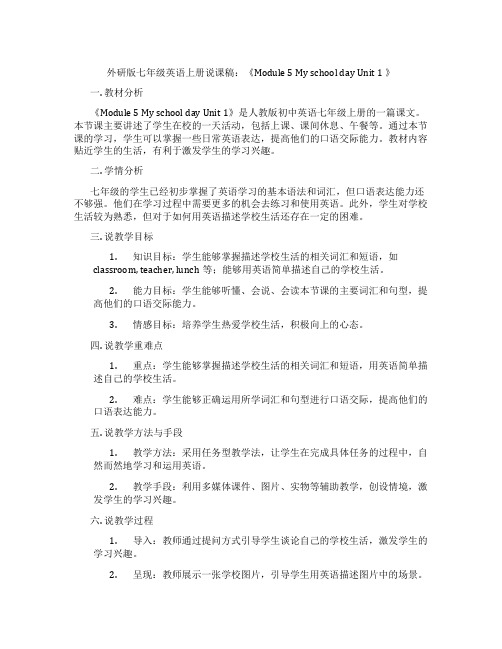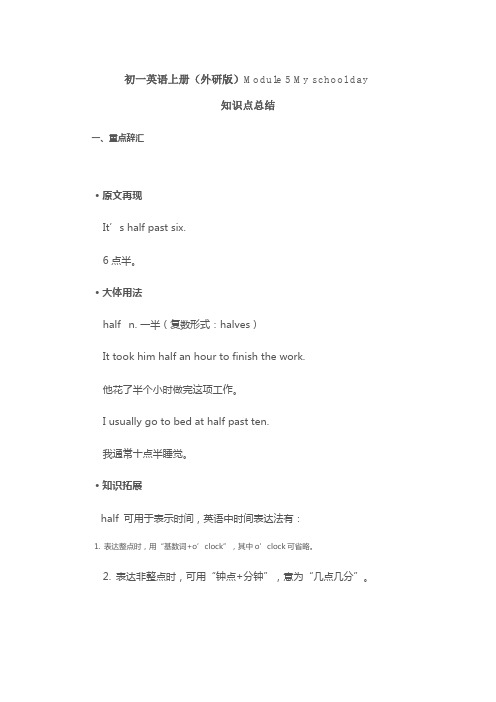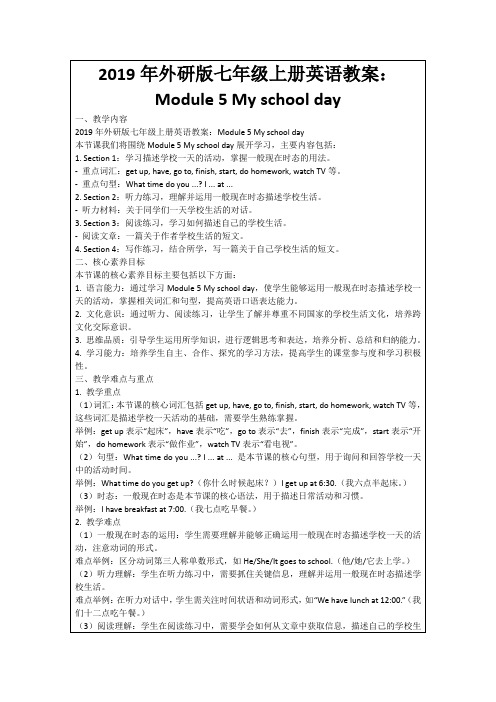2018~2019学年七年级英语上册Module5MyschooldayUnit1Ilovehistory考点直击练习新外研版
七年级英语上册 Module 5 My school day Unit 3 Language in

Module 5 My school day.Unit 3 Language in use学习目标1、一般现在时的用法2、熟悉“do”的用法:①做助动词:“do / does”构成疑问或否定;第一、第二人称用“do”,第三人称单数用“does”;Eg: 构成一般疑问句:Do you like maths? 构成否定句:We don’t have maths.②做行为动词,表示“做……”: do my homework3、熟悉“have”的用法:①做助动词;②做实意动词:“有……”,“吃……”;4、短语:in the morning, in the afternoon, in the evening.学习重难点1、一般现在时的用法2、熟悉“do”的用法:课前预习Ⅰ. Matchhave do godinner your homework to school a break an English lesson to bed home Ⅱ. My weekday 谈谈你一个星期的活动用一般现在时造句:肯定句Eg: I go to school on Monday. I go home at…_______________________________________________________ (get up)___________________________________________________ (do my homework)否定句Eg: I don’t go to school on Sunday. 用“don’t”_____________________________________________ (have lessons)________________________________________________ (get up at six o’clock)●课堂学习研讨Ⅰ. Share your activities 分享你一周的活动1. I get up at…2. I go to school at …3. I don’t go to school on Sunday…Ⅱ. Finish exercise 2, exercise 3, exercise 4 and exercise 5. 完成练习(P30:2—5)Ⅲ. Around the worldThe school day in the UK (英国的学校日)What is your school d ay like in China. 你在中国的学校日是怎么样的呢?Ⅳ. Talk about your ideal sc hool day. 谈谈你理想中的学校一天的活动Activities Timeget upgo to schoolhave a break......● 课后巩固练习Ⅰ. 单项选择( ) 1. Maths _______ a useful subject. A. am B. is C. are D. be( ) 2. We _______ to bed at ten o’clock. A. go B. to go C. goes D. going ( ) 3. Tom has three classes _______the morning and has a break ________ half past seven.A. in; inB. in; atC. on; atD. at;in( ) 4. My mother ________ have lunch at home because she is at work in her office.A. don’tB. doesn’tC. isn’tD. hasn’t( ) 5. —When does your mother go shopping? —Usually _______ Sunday morning.A. onB. inC. atD. for( ) 6. Betty likes _______ very much. She draws pictures every day.A. artB. mu sicC. sportD. science( ) 7. I usually do some reading ______ 6:00 pm ______ 8:00 pm.A. at; toB. at; atC. between; toD. from; to( ) 8. I’m tired. Let’s _______.A. have a breakB. runC. go to schoolD. play basketball( ) 9. —_______ is the talk show? —It’s in the morning.A. WhereB. WhenC. What timeD. How( ) 10. It’s time _______ school. A. to B. at C. for D. inⅡ. 句型转换1. We have lunch at half past twelve. (改为否定句)We ________ _________ lunch at half past twelve.2. In the morning, we have a break. We talk to our fri ends. (用and连接两个句子)In the morning, we have a break _______ ________ ________ _________ ________.3. I play football at 4:30 every Saturday. (改为一般疑问句)_______ you _______ football a t 4:30?4. We have Chinese lessons at 8:30. (对划线部分提问)_______ ________ do you have Chinese lessons?5. Mary and Max always go to bed at 9:00. (对划线部分提问)_______ _______ Mary and Max always do at 9:00?如有侵权请联系告知删除,感谢你们的配合!。
外研版七年级英语上册说课稿:《Module5MyschooldayUnit1》

外研版七年级英语上册说课稿:《Module 5 My school day Unit 1 》一. 教材分析《Module 5 My school day Unit 1》是人教版初中英语七年级上册的一篇课文。
本节课主要讲述了学生在校的一天活动,包括上课、课间休息、午餐等。
通过本节课的学习,学生可以掌握一些日常英语表达,提高他们的口语交际能力。
教材内容贴近学生的生活,有利于激发学生的学习兴趣。
二. 学情分析七年级的学生已经初步掌握了英语学习的基本语法和词汇,但口语表达能力还不够强。
他们在学习过程中需要更多的机会去练习和使用英语。
此外,学生对学校生活较为熟悉,但对于如何用英语描述学校生活还存在一定的困难。
三. 说教学目标1.知识目标:学生能够掌握描述学校生活的相关词汇和短语,如classroom, teacher, lunch等;能够用英语简单描述自己的学校生活。
2.能力目标:学生能够听懂、会说、会读本节课的主要词汇和句型,提高他们的口语交际能力。
3.情感目标:培养学生热爱学校生活,积极向上的心态。
四. 说教学重难点1.重点:学生能够掌握描述学校生活的相关词汇和短语,用英语简单描述自己的学校生活。
2.难点:学生能够正确运用所学词汇和句型进行口语交际,提高他们的口语表达能力。
五. 说教学方法与手段1.教学方法:采用任务型教学法,让学生在完成具体任务的过程中,自然而然地学习和运用英语。
2.教学手段:利用多媒体课件、图片、实物等辅助教学,创设情境,激发学生的学习兴趣。
六. 说教学过程1.导入:教师通过提问方式引导学生谈论自己的学校生活,激发学生的学习兴趣。
2.呈现:教师展示一张学校图片,引导学生用英语描述图片中的场景。
3.新课内容:教师引导学生学习本节课的主要词汇和句型,如classroom, teacher, lunch等,并通过例句展示如何用英语描述学校生活。
4.练习:学生分组进行角色扮演,模拟学校生活中的场景,用英语进行对话。
外研版2018-2019学年七年级英语第一学期Module5Myschoolday单元测试题(含答案)

Module 5Ⅰ.单项选择(每小题1分,共15分)( )1.My brother does ________ homework every day.A.many B.anyC.much D.a lots of( )2.I often have a ________ day at school, but I am very happy.A.free B.busyC.good D.bad( )3.We________ history in the morning.A.haven't B.don't haveC.doesn't have D.not have( )4.We have a break and I talk________ my friends.A.in B.onC.with D.of( )TV News is ________ 7:00 to 7:30 every evening.A.at B.ofC.from D.on( )6.My brother wants to be a good painter (画家) because he likes________.A.history B.ChineseC.art D.maths( )7.We don't________ TV________ weekdays.A. watch; inB. watch; onC. watching; atD. watches; on( )8.—When do you often get up?—I often get up at ________ in the morning.A.half past six B.thirty sixC.seven thirty past D.half to two( )9. We have a________ between two lessons.A. lessonB. breakC. dayD. lunch( )10.—Li Ming, ________ lessons do you have on Monday afternoon? —IT and art.A.how B.whatC.when D.where( )11.—What day is it today?—________.A.It's seven o'clockB.It's SundayC.It's time to bedD.It's five( )12.The plane arrived in Hong Kong ________ Saturday morning. A.at B.inC.on D.about( )13.Our science class ________ 9:30.A.start in B.starts inC.start at D.starts at( )14.Some students ________ their homework in the evening.A.don't B.aren'tC.don't do D.are do( )15.—Do they like tennis?—________.But they like basketball.A.Yes, they areB.No, they aren'tC.No, they don'tD.Yes, they doⅡ.完形填空(每小题1分,共10分)Today is Friday. I get up__16__ half past six in the morning. I have milk and bread for __17__. I go to school by bike. Lessons start at 8:00. I have two Chinese lessons, an __18__ lesson and a maths lesson. Lessons __19__ at 11:30. We have no lessons in the afternoon. Some students go home but I have lunch at school __20__ my good friend Yu Xin. I eat __21__ and French fries for lunch. My mum tells me they're not good for my health, but I still like __22__ them very much. After lunch, Yu Xin and I play football __23__ the playground. In the afternoon, we go to the __24__. After watching the film(电影), I say__25__ to Yu Xin and go home. I have a happy day today.( )16. A. in B. on C. at D. for( )17. A. breakfast B. lunch C. dinner D. supper( )18. A. Chinese B. chemistry C. art D. maths( )19. A. start B. come C. begin D. end( )20. A. and B. or C. with D. so( )21. A. rice B. apples C. hamburgers D. vegetables( )22. A. drinking B. making C. eating D. getting( )23. A. in B. under C. at D. for( )24. A. park B. stadium(体育场) C. hotel D. cinema(电影院)( )25. A. hello B. goodbye C. sorry D. thanksⅢ.阅读理解(每小题2分,共20分)ATom comes from Australia. Now he stays in Beijing with his family. Every day he gets up at about six thirty and has breakfast at seven o'clock. Then he leaves home at seven fifteen. He gets to school at seven fortyfiv e. His first class begins at eight. There are four lessons in the morning. Morning classes are over at eleven fifty, and he has lunch ten minutes later.Afternoon classes begin at one thirty. There are two lessons in the afternoon. They are over at three ten. Tom stays at school for another hour to play games, and he gets home at about four thirty.Tom usually has supper at six. In the evening he does his homework. Sometimes he watches TV. He goes to bed at about ten.( )26.Tom comes from ________.A.England B.CanadaC.America D.Australia( )27.It takes Tom ________ to get to school every day.A.two hours B.half an hourC.fifteen minutes D.an hour( )28.Tom usually has lunch at ________.A.11:50 B.12:00C.12:10 D.12:20( )29.Tom does his homework ________.A.in class B.at schoolC.in a park D.at home( )30.Tom has ________ lessons every day.A.six B.fourC.eight D.twoBMy name is Jack. I get up at seven o'clock. And then I put on my clothes, wash my hands and face, and brush__my__teeth. I have breakfast at half past seven. Ioften have some bread, an apple and milk for breakfast.I have maths, English and art in the morning. My favourite subject is art because I like drawing. Now I'm in the art room. There are many pictures on the wall.It's twelve o'clock and it's time for lunch. I don't go home to have lunch.I have school lunch in the dining hall. There are seven students in it. We have different food here.( )31.Jack gets up at ________.A.6:00 B.6:30C.7:00 D.7:30( )32.Jack has ________ for breakfast.A.some hamburgers and juiceB.some bread, an apple and milkC.some carrots, pork and orangesD.some bread, an apple and juice( )33.How many lessons does Jack have in the morning?A.Two. B.Three.C.Four. D.Five.( )34.Where does Jack have lunch?A.At home.B.In the classroom.C.In the dining hall.D.In a restaurant.()35.The underlined phrase “brush my teeth” means “________” in Chinese.A.洗澡 B.洗头C.洗脸 D.刷牙Ⅳ.任务型阅读(每小题2分,共10分)Helen is my pen friend. She comes from London. Now, I'll tell you her school day on Wednesday.She goes to school at half past seven in the morning. Classes begin at eight o'clock. There ①________ a maths lesson and two Engli sh lessons in the morning. At half past nine, she does eye exercises.②School__is__over__at__half__past__eleven.At twelve o'clock she has lunch at school.In the afternoon, she has two lessons—history and science. ③1:45开始上课。
初一英语上册(外研版)module5myschoolday知识点总结

初一英语上册(外研版)Module 5 My school day知识点总结一、重点辞汇·原文再现It’s half past six.6点半。
·大体用法half n. 一半(复数形式:halves)It took him half an hour to finish the work.他花了半个小时做完这项工作。
I usually go to bed at half past ten.我通常十点半睡觉。
·知识拓展half 可用于表示时间,英语中时间表达法有:1. 表达整点时,用“基数词+o’clock”,其中o’clock可省略。
2. 表达非整点时,可用“钟点+分钟”,意为“几点几分”。
3. 若是分钟数不超过30,可用“分钟+past+钟点”表达,其中past是介词,意为“超过”。
·出题建议进入语法专练模板,选择数词下的“时刻表达法”,勾选需要的题型,如:单选、完成句子等,同时在关键词中输入:half,就可以够找到用half表示时间的题目了。
·原文再现Betty, what are our lessons on Monday?贝蒂,礼拜一咱们上什么课?·大体用法1. lesson n. 课,是可数名词。
I missed a lesson yesterday.昨天我误了一节课。
2. lesson n. 教训,draw a lesson from… 意为“从…中吸取教训”。
We should draw a lesson from failure.咱们应该从失败中吸取教训。
·知识拓展--相关短语have (a) lessons 上课Today we have a lesson in geometry.今天,咱们有一节几何课。
·原文再现Do you like maths, Tony?你喜欢数学吗,托尼?·大体用法like v. 喜欢(过去式:liked 过去分词:liked 此刻分词:liking 第三人称单数:likes)Do you like pop music?你喜欢流行音乐吗?·知识拓展相关句型/结构like to do/doing 喜欢做某事I like to watch movies/watching movies after class.我喜欢下学后看电影。
2018-2019学年七年级英语上册 Module 5 My school day Unit 2 W

Module 5 My school day Unit 2 We start work at nine o’clock.1. ① My father is very busy on(工作日).②—What do you often do on(周末)?—I often go to the park.2. 用house, family或home填空①We live in a large_______________ .② I love Bei jing and it’s my _____________in my mind.③—How many people are there in your_________ ?—There are five.3. Maybe there is something wrong with my car. I can’t _________it.A. moveB. beginC. startD. work4. ① He starts his (工作) at 8 o’clock.② My uncle is a (work).③他们工作非常努力。
They very hard.④他从五点工作到九点。
He from five to nine.⑤ The machine can do the of three people. A.work B.jobC.jobs D.works5. 到我们休息一下的时间了。
It’s time for us to .6. 用see, watch或look的适当形式填空①Let’s TV now.② I like the football match (比赛).③ I can an apple on the table.④! Tom is over there.7. ① I (do not) like maths. It’s too difficult.②他们今天没做作业。
七年级英语上册Module5MySchoolDayUnit2Westartworkatnineo’c

Module 5 My School Day一、教学目标1. 重点单词:half, past, o’clock, to, art, g eography, history, IT, maths, (Am E math ), PE ( physical education ), lesson, then, like, difficult, love, subject, because, interesting, talk, begin, when, weekday, house, start, work, break, evening, watch, do, homework, bed, sleep, park, busy, wash, face, minute2. 重点短语:go to school,get up, have breakfast, have lunch, go home, have dinner, go to bed, go to sleep3.重点句子:1) I love history.2) It’s twelve o’clock .3) We have Chinese at eight o’clock.4) We don’t have maths.5) —Do you like maths?—Yes, I do.6) In the evening, I watch TV and have dinner with my family.7) I get up at half past seven in the morning and have breakfast.8) I drink Cola or water.9) We start work at nine o’clock.二、重点及难点:1.时刻的表达方式。
2.用在时刻前的介词(at , in , on)的用法。
3.一样此刻时的陈述句形式(主语为I, they, we, you)。
2019年外研版七年级上册英语教案:Module5Myschoolday

3.思维品质:引导学生运用所学知识,进行逻辑思考和表达,培养分析、总结和归纳能力。
4.学习能力:培养学生自主、合作、探究的学习方法,提高学生的课堂参与度和学习积极性。
三、教学难点与重点
1.教学重点
(1)词汇:本节课的核心词汇包括get up, have, go to, finish, start, do homework, watch TV等,这些词汇是描述学校一天活动的基础,需要学生熟练掌握。
五、教学反思
在今天的教学过程中,我发现学生们对于Module 5 My school day这一章节的内容表现得非常积极。他们在课堂上认真听讲,主动参与讨论,这让我深感欣慰。然而,通过今天的授课,我也意识到了一些需要改进的地方。
首先,关于一般现在时态的教学,我注意到部分学生在运用这个时态时仍然存在一些困难。特别是在动词第三人称单数形式的变换上,容易犯错。为了帮助学生更好地掌握这个语法点,我决定在接下来的课程中增加一些专门的练习,如填空、改错等,以强化他们的记忆。
在接下来的教学中,我会针对以下几点进行改进:
1.加强对一般现在时态的讲解和练习,尤其是动词第三人称单数形式的变化规则。
2.提供更多场景模拟和角色扮演的机会,让学生在实际语境中练习英语表达。
3.关注每个学生的学习状态,鼓励他们积极参与课堂讨论,提高课堂互动性。
举例:get up表示“起床”,have表示“吃”,go to表示“去”,finish表示“完成”,start表示“开始”,do homework表示“做作业”,watch TV表示“看电视”。
(2)句型:What time do you ...? I ... at ...是本节课的核心句型,用于询问和回答学校一天中的活动时间。
- 1、下载文档前请自行甄别文档内容的完整性,平台不提供额外的编辑、内容补充、找答案等附加服务。
- 2、"仅部分预览"的文档,不可在线预览部分如存在完整性等问题,可反馈申请退款(可完整预览的文档不适用该条件!)。
- 3、如文档侵犯您的权益,请联系客服反馈,我们会尽快为您处理(人工客服工作时间:9:00-18:30)。
Module 5 My school day
Unit 1 I love history.
1. ①数学是我最喜欢的科目。
my favourite subject.
②历史很有趣。
is very interesting.
③我们喜欢音乐课。
We like classes.
2. ① We have three l in the afternoon: Chinese, music and art.
②我们每天都上课。
We every day.
3. ①他喜欢打篮球。
He basketball.
② They like coffee in the morning.
A. drink
B. drinking
C. to drinking
D. drinks
③ We don’t like running. (词语释义)
A. like
B. love
C. enjoy
D. dislike
④他热爱科学。
He science.
4. I can’t speak English well. It is too for me.
A. diff icult
B. easy
C. good
D. well
① The book is very ______________(interest) and I like it very much.
② Are you ____________(interest)in music?
6. ① I want to ________________(谈话)with you.
② My granny often _____________me about her lives in the old age.
A. says
B. tells
C. speaks
D. talks
7. ① The meeting will ____________________(开始) soon.
② They begin to do homework after school.(翻译句子)
_____________________________
8. ①我们九点上语文课。
We have Chinese at .
②用逆读法写出下列时间的英语表达方式
3:20 ______________
6:50_________________
9:30 __________________
2:15 _______________________-
③ They have physics half past ten.
A. on
B. in
C. at
D. for
9. ①他们星期四上体育课。
They have PE _______________.
② We will have a party Wednesday morning.
A. in
B. on
C. at
D. with
10. ①你下午通常做什么?
What do you usually do _______-?
②我晚上不看电视。
I don’t watch TV _______________.
③ They have lunch __________noon.
A. at
B. in
C. on
D. for
11. ①他们擅长跑步。
They are ________________running.
②I’m good at painting. (改为同义句)
I ____________painting.
③ Eating fruit and vegetables is ___________your health.
A. good at
B. good to
C. good for
D. good with
12. ①—What t____________ is it?
—It’s half past ten.
②What’s the time? (改为同义句)
_______________is it?
13. ①我三点上英语课。
I at three o’clock.
② They have chemistry on Monday. (改为否定句)
They ______________chemistry on Monday.
14. ①你喜欢英语吗?
______________________English?
②他们不喜欢游泳。
They ______________swimming.
15. They have English and maths in the morning. (对画线部分提问) ____________they in the morning?
16. ①— do you like music?
—Because it is very interesting.
A. What
B. When
C. Why
D. Where
②我每天早晨跑步,因为我喜欢跑步。
I go running every morning I like running.
17. ①— do you have chemistry?
—On Thursday afternoon.
A. Where
B. What
C. When
D. Why
②现在几点了?
is it now?
③你的生日是什么时候?
is your birthday?
详解详析
Unit 1I love history.考点直击
单词精讲
1.①Maths is②History ③music
2.①le ssons ②have classes/lessons
3.①likes playing②B③D④loves
4. A
5.①interesting②interested
6.①talk②B
7.①begin/start②放学后他们开始做家庭作业。
短语赏析
8.①nine o'clock
②twenty past three; ten to seven; half past nine;
a quarter past two
③C
9.①on Thursday②B
10.①i n the afternoon ②in the evening③A
11.①good at②do well in③C
句型解读
12.①time②What time
13.①have English②don't have
14.①Do you like②don't like
15. What lessons/classes do; have
16.①C②because
17.①C②What time③When。
